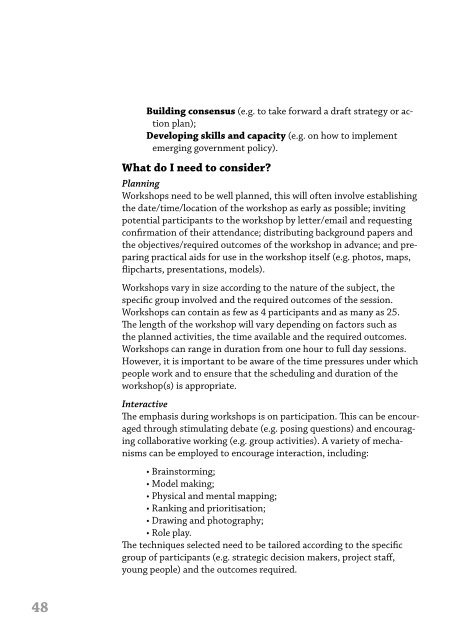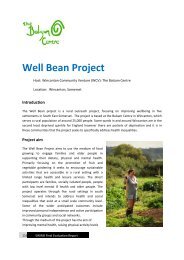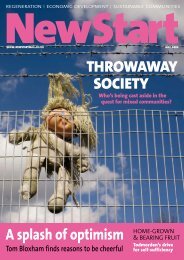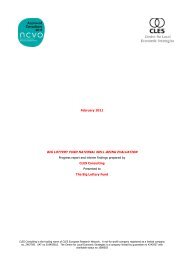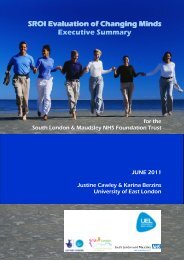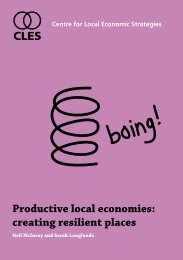Research Methods Handbook.pdf - CLES
Research Methods Handbook.pdf - CLES
Research Methods Handbook.pdf - CLES
Create successful ePaper yourself
Turn your PDF publications into a flip-book with our unique Google optimized e-Paper software.
Building consensus (e.g. to take forward a draft strategy or actionplan);Developing skills and capacity (e.g. on how to implementemerging government policy).What do I need to consider?PlanningWorkshops need to be well planned, this will often involve establishingthe date/time/location of the workshop as early as possible; invitingpotential participants to the workshop by letter/email and requestingconfirmation of their attendance; distributing background papers andthe objectives/required outcomes of the workshop in advance; and preparingpractical aids for use in the workshop itself (e.g. photos, maps,flipcharts, presentations, models).Workshops vary in size according to the nature of the subject, thespecific group involved and the required outcomes of the session.Workshops can contain as few as 4 participants and as many as 25.The length of the workshop will vary depending on factors such asthe planned activities, the time available and the required outcomes.Workshops can range in duration from one hour to full day sessions.However, it is important to be aware of the time pressures under whichpeople work and to ensure that the scheduling and duration of theworkshop(s) is appropriate.InteractiveThe emphasis during workshops is on participation. This can be encouragedthrough stimulating debate (e.g. posing questions) and encouragingcollaborative working (e.g. group activities). A variety of mechanismscan be employed to encourage interaction, including:• Brainstorming;• Model making;• Physical and mental mapping;• Ranking and prioritisation;• Drawing and photography;• Role play.The techniques selected need to be tailored according to the specificgroup of participants (e.g. strategic decision makers, project staff,young people) and the outcomes required.Outcome focusedIt is imperative that workshops have clear objectives and are groundedin the required outcomes of the session. Key to the achievement of thisare the pre-workshop activities that are undertaken to design, plan andprepare for the workshop itself (see above). The emphasis on outcomesis important for all concerned – it enables a gathering of information,perceptions and responses to contribute to the overall research, whilstenabling participants to understand the focus of the session, which,in turn, allows them to play a full role. If your participants understandyour aims for the workshop, then the session is likely to be more productive.What is the output?The output of a workshop will be dependant on the types of activitiesundertaken, but may include flip chart material, drawings and diagramsand lists of factors, possibly ranked. It is important that all materialsand notes from the workshop are collated, analysed and fed into theresearch findings.How should it be analysed?QSR International’s NUD*IST & NVIVO computer packages enablenon-statistical information from group work, observations, audio,video, pictures or documents to be analysed according to chosen criteria.These are powerful pieces of software that can provide clarity to awide range of often complicated written or media materials (see sectionon qualitative survey analysis).Further ReadingComputer Assisted Qualitative Data Analysis (CAQDA) – http://caqdas.soc.surrey.ac.uk/ - provides practical support, training and informationin the use of a range of software programs designed to assist qualitativedata analysis. Also provides various platforms for debate concerningthe methodological and epistemological issues arising from the use ofsuch software packages.Facilitating Workshops – Practical Tips for Workshop Facilitators,Seeds for Changehttp://www.seedsforchange.org.uk/free/facilwsh.<strong>pdf</strong>48 49


